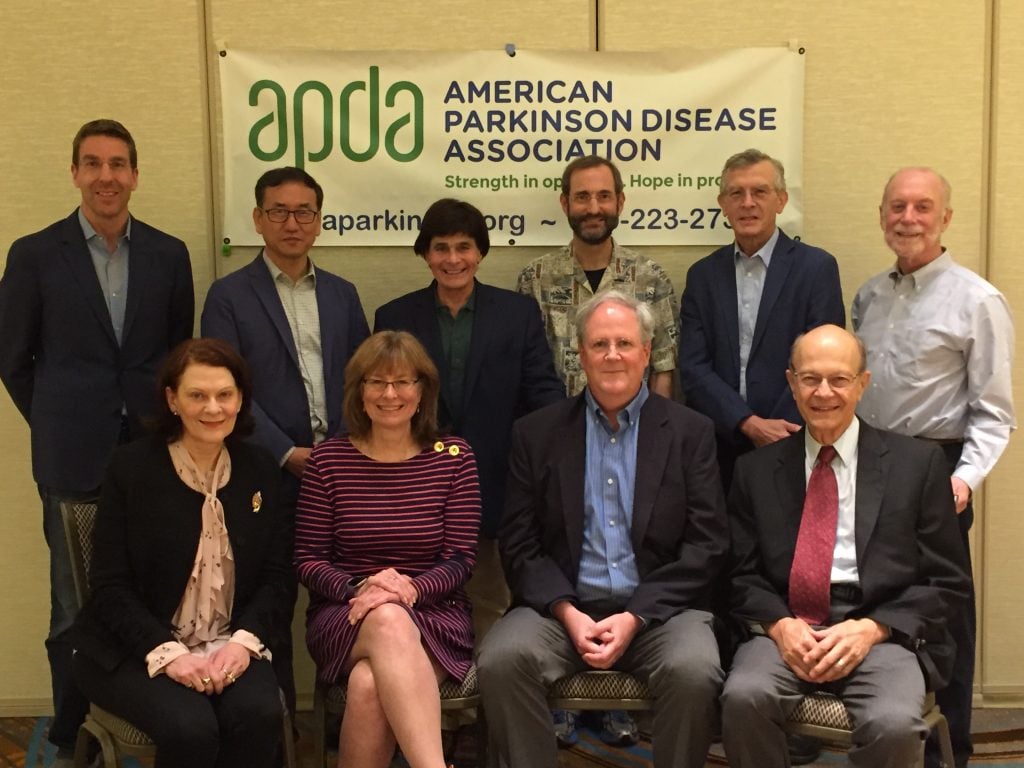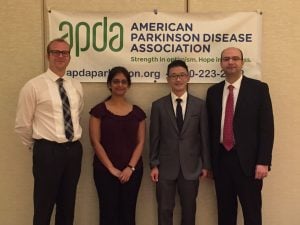NEW YORK, NY, May 26, 2017 – The American Parkinson Disease Association’s Scientific Advisory Board (SAB) met this week to review more than eighty-nine grant submissions all vying for nearly $1,000,000 in funding that will be awarded to both experienced and emerging young scientists in the Parkinson’s field.
The American Parkinson Disease Association (APDA) is focused on advancing scientific research that will support its mission to provide the support, education, and research that will help everyone impacted by Parkinson’s disease live life to the fullest. “APDA is committed to investing in high impact science that can change the course of this disease,” commented Dr. David G. Standaert, Chairman of the SAB. “As we evaluate these proposals we focus on funding researchers who are at the start of their Parkinson’s research career. Our aim is to accelerate research and support translational ideas that have the potential to truly improve the quality of life and make a difference.”
APDA’s SAB is comprised of scientists with a wide array of backgrounds and expertise in all areas relevant to Parkinson’s disease (PD) whose research holds promise to discovering new insights etiology and treatment of the disease. Post-Doctoral Fellowships are awarded at $35,000 per year, while Research grants are awarded at $50,000 per year. Additionally, the prestigious Dr. George C. Cotzias Fellowship is a $240,000 grant given over three years to support promising young physicians and researchers who are rising stars working to establish their careers in research, teaching and patient service relevant to the problems, causes, prevention, diagnosis and treatment of PD and related neurological movement disorders.
APDA Scientific Advisory Board: (Back row L-R) Clemens R. Scherzer, MD, Harvard Medical School and Brigham & Women’s Hospital; Un Jung Kang, MD, Columbia University College of Physicians and Surgeons; Evan Yale Snyder, MD, PhD, The Burnham Institute; Joel S. Perlmutter, MD, Washington University School of Medicine; Dennis W. Dickson, MD, Mayo Clinic, Jacksonville; Richard Myers, PhD, Boston University School of Medicine. (Front row L-R); Marie Hélène Saint-Hilaire, MD, FRCP (C), Boston University School of Medicine; Leslie A. Chambers, President & CEO, APDA; David G. Standaert, MD, PhD, Chairman of the APDA SAB, University of Alabama at Birmingham, School of Medicine; Mahlon R. DeLong, MD, Emory University School of Medicine. (Not pictured); Marie-Francoise Chesselet, MD, PhD, David Geffen School of Medicine at UCLA; J. Timothy Greenamyre, MD, PhD, University of Pittsburgh Medical Center; Laura Marsh, MD, Michael E. DeBakey, VA Medical Center; Mary Maral Mouradian, MD, Rutgers Robert Wood Johnson Medical School.
This critical research funding is only possible due to the financial support from APDA’s steadfast supporters and the dedicated work of the SAB who gather on a regular basis to diligently review and recommend funding the most cutting edge projects.
The SAB meeting included research presentations from four of APDA’s 2016-2017 grantees who each represent a vast diversity of PD research areas.
Post-Doctoral Fellows:
Hazem Abdelkarim, PhD, University of Illinois at Chicago: Dr. Abdelkarim is seeking to structurally and biophysically characterize the direct interactions between alpha-synuclein and
(L-R) Hannes Devos, PhD, Kansas University Medical Center; Vinita Ganesh Chittoor, PhD, Oregon Health & Science University; Beom-Chan Lee, PhD, University of Houston; Hazem Abdelkarim, PhD, University of Illinois at Chicago
glycosphingolipids to determine if glycosphingolipids can modulate the association of monomeric alpha-synuclein into either toxic or nontoxic oligomers.
Vinita Ganesh Chittoor, PhD, Oregon Health & Science University: Dr. Chittoor is focused on studying the effects of altered dietary amino acids on dopamine neuron degeneration and locomotor impairment associated with mutant G2019S LRRK2, and to assess the role of TOR signaling in the effects of dietary amino acids on G2019S LRRK2-induced phenotype.
Findings from either of these studies could potentially lead to drug development that might help slow down PD progression.
APDA Research Grantees:
Beom-Chan Lee, PhD, University of Houston: The SAB was enthused to see the progress made by Dr. Lee in his work to assess the impacts on long-term rehabilitative training for people with PD who receive in-home balance exercises with assistive guidance via the smartphone-based biofeedback system, called Smarter Balance System (SBS). This work is investigating the effects of improved postural control and how that carries over to confidence in daily activities and less fear of falling.
Hannes Devos, PhD, Kansas University Medical Center: Dr. Devos is comparing the cognitive workload during simple and challenging cognitive tasks between individuals with PD and controls with no neurological condition to understand if those with abnormally high Task Evoked Pupillary Response or TEPR values may be at risk of early cognitive decline. If successful, this TEPR evaluation could alert clinicians very early to cognitive changes that would otherwise go unnoticed.
The American Parkinson Disease Association (APDA) proudly invests in the most promising clinicians and scientific projects focused on the discovery of the cause(s) and finding the cure for Parkinson’s disease. APDA is committed to scientific research and has been a funding partner in most major Parkinson’s disease scientific breakthroughs, investing more than $46 million in research since 1961. Many APDA-funded researchers have successfully leveraged pilot data to secure multi-million dollar grants through the National Institutes of Health.
The announcement of 2017-2018 grant funding will take place in August.
CONTACT: Stephanie Paul | 718-981-8062 | spaul@apdaparkinson.org | apdaparkinson.org


